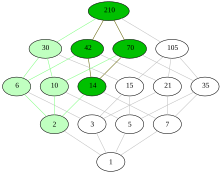Ultrafilter
ordered by set inclusion, is always a Boolean algebra and hence a poset, and ultrafilters onThis implies that any filter that properly contains an ultrafilter has to be equal to the whole poset.A principal (or fixed, or trivial) ultrafilter is a filter containing a least element.is hence non-principal if and only if it contains the Fréchet filter of cofinite subsets ofis infinite then the Fréchet filter is not an ultrafilter on the power set ofEvery filter on a Boolean algebra (or more generally, any subset with the finite intersection property) is contained in an ultrafilter (see ultrafilter lemma) and free ultrafilters therefore exist, but the proofs involve the axiom of choice (AC) in the form of Zorn's lemma.On the other hand, the statement that every filter is contained in an ultrafilter does not imply AC.Indeed, it is equivalent to the Boolean prime ideal theorem (BPIT), a well-known intermediate point between the axioms of Zermelo–Fraenkel set theory (ZF) and the ZF theory augmented by the axiom of choice (ZFC).In general, proofs involving the axiom of choice do not produce explicit examples of free ultrafilters, though it is possible to find explicit examples in some models of ZFC; for example, Gödel showed that this can be done in the constructible universe where one can write down an explicit global choice function.[5] An important special case of the concept occurs if the considered poset is a Boolean algebra.In this case, ultrafilters are characterized by containing, for each element[6] Moreover, ultrafilters on a Boolean algebra can be related to maximal ideals and homomorphisms to the 2-element Boolean algebra {true, false} (also known as 2-valued morphisms) as follows: Given an arbitrary setordered by set inclusion, is always a Boolean algebra; hence the results of the above section apply.[1] Ultrafilters on power sets are useful in topology, especially in relation to compact Hausdorff spaces, and in model theory in the construction of ultraproducts and ultrapowers.Every ultrafilter on a compact Hausdorff space converges to exactly one point.Likewise, ultrafilters on Boolean algebras play a central role in Stone's representation theorem.In set theory ultrafilters are used to show that the axiom of constructibility is incompatible with the existence of a measurable cardinal κ.This is proved by taking the ultrapower of the set theoretical universe modulo a κ-complete, non-principal ultrafilter.can be topologized in a natural way, that is in fact closely related to the above-mentioned representation theorem.-indexed models; for example, the compactness theorem can be proved this way.In the special case of ultrapowers, one gets elementary extensions of structures.To extend the familiar functions and relations (e.g., + and <) from the reals to the hyperreals, the natural idea is to define them pointwise.But this would lose important logical properties of the reals; for example, pointwise < is not a total ordering.So instead the functions and relations are defined "pointwise modulo"is an ultrafilter on the index set of the sequences; by Łoś' theorem, this preserves all properties of the reals that can be stated in first-order logic.Asymptotic cones are particular examples of ultralimits of metric spaces.Gödel's ontological proof of God's existence uses as an axiom that the set of all "positive properties" is an ultrafilter.In social choice theory, non-principal ultrafilters are used to define a rule (called a social welfare function) for aggregating the preferences of infinitely many individuals.Contrary to Arrow's impossibility theorem for finitely many individuals, such a rule satisfies the conditions (properties) that Arrow proposes (for example, Kirman and Sondermann, 1972).[8] Mihara (1997,[9] 1999)[10] shows, however, such rules are practically of limited interest to social scientists, since they are non-algorithmic or non-computable.
order theoryUltrafilter (set theory)ultrafiltrationHasse diagramdivisorsupper setmathematicalpartially ordered setmaximalfilterproper filterpower setset inclusionBoolean algebraultrafilters on the setfinitely additivemeasurealmost everythingmodel theorytopologysubsetproper filtersproper subsetleast elementprincipal filterFréchet filtercofinite subsetsfinite–cofinite algebrafinite intersection propertyultrafilter lemmaaxiom of choiceZorn's lemmaBoolean prime ideal theoremZermelo–Fraenkel set theoryGödelconstructible universeprime filter2-valued morphismsinverse imageintersection2-valued morphismcontentalmost everywherepower setscompactHausdorffultraproducts and ultrapowersStone's representation theoremset theoryaxiom of constructibilitymeasurable cardinaltopological spaceStone–Čech compactificationdiscrete spaceultraproductcompactness theoremelementary extensionsnonstandard analysishyperreal numbersreal numbersdomain of discoursesupersetindex setŁoś' theoremfirst-order logicgeometric group theoryultralimitsmetric spacesGödel's ontological proofsocial choice theoryArrow's impossibility theoremFilter (mathematics)Filter (set theory)Filters in topologyThe ultrafilter lemmaUniversal netIntroduction to Lattices and OrderCiteSeerXJournal of Mathematical EconomicsArkhangel'skii, Alexander VladimirovichD. ReidelBourbaki, NicolasTopologie GénéraleÉléments de mathématiqueDixmier, JacquesSpringer-VerlagDugundji, JamesCsászár, ÁkosJech, ThomasSchechter, EricSchubert, HorstBulletin of the American Mathematical SocietyYouTube